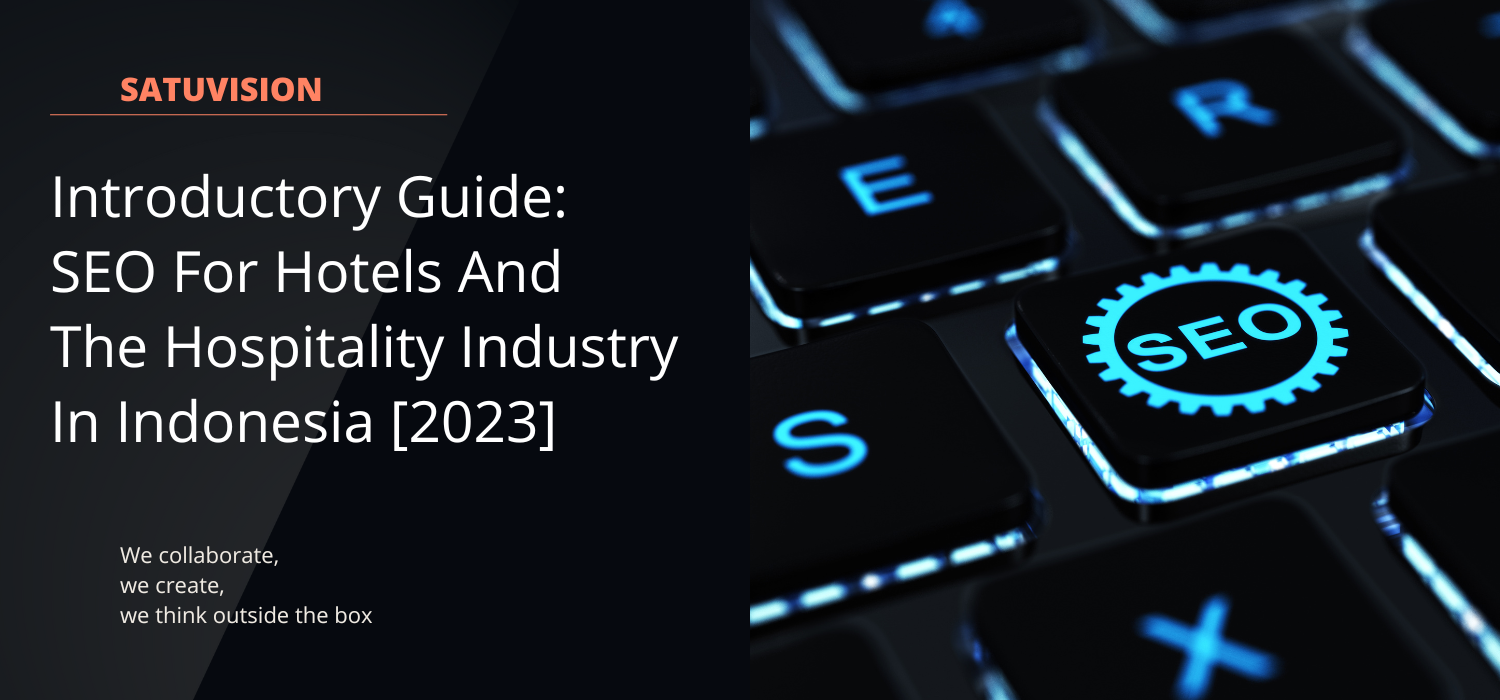Table of Contents
The hospitality industry is very competitive in Indonesia. Indonesia’s beautifully diverse culture and geography make many of its islands popular tourist destinations. Due to this competitiveness, it is important to make sure that your site stands out by ranking higher in the SERPs (Search Engines Result Pages).
Now, many know that SEO (Search Engine Optimization) is a crucial part of digital marketing for hotels. But, how many of us fully understand the function of SEO for hotels?
In this article, we will help you fully understand the importance of SEO.
Understanding SEO For Hotels
SEO is the process of optimizing a hotel’s website to make it more visible in the search results of a SERP such as Google and as a result, boosting its online presence. Given that most travelers nowadays utilize the internet to research and book their accommodations, having a strong SEO strategy is essential for hotels in Indonesia to stand out from the competition and attract more organic traffic.
Organic traffic is website visitors through unpaid channels.
Crafting a well-planned SEO strategy will ensure that when people search for certain keywords or phrases, your website or online profile is one of the first and most relevant results that pop up. This could potentially increase the chances of users clicking through to your website, and ultimately result in booking a room with your hotel.
Keep in mind, SEO is a long-term game and not a short-term fix. Don’t expect overnight success from optimizing your search engine strategies. Consistency is key to achieving sustained success and visibility in the digital realm.
TO LEARN MORE ABOUT DIGITAL MARKETING FOR HOTELS: Digital Advertising for Hotels Business: Beginner-Friendly Guide to Follow
Why Is SEO so Important For Hotels?
Optimizing your hotel website with SEO will result in your website ranking or position higher on search results. Unlike other marketing channels, SEO is one of the most cost-effective strategies for your hotel to increase online visibility. This is because SEO can be completely free.
Let’s compare SEO and paid marketing channels for a little bit. A paid marketing channel is the faster way to gain traffic and impressions, however, when you stop paying, you will lose those metrics. On the other hand, SEO is a long-term strategy that potentially brings everlasting traffic to your website. Delayed gratification right here.
Webpages with higher positions in the search results of a SERP received the highest CTR (click-through rate), most clicks, and traffic. Here is a study from sistrix.com.

CTR represents the ratio of people who click on a website to the number of people who saw a website on search engines. Look at how vastly different the CTR is from being in the first position to being in the tenth position. Being on the second page will result in smaller traffic.
Unlike paid traffic, organic traffic is more sustainable in the long term (since it is free and everlasting!). Hotel searches are usually coming from high-intent searchers, which means they are more likely to convert into paying guests for your hotel. When it comes to direct bookings, it is always better than bookings from OTAs (Online Travel Agents) because it is commission free.
Keyword Research For Your Hotel SEO
Relevancy is one of the most important factors in SEO. Search engines are trying to provide the most relevant results whenever someone enters a search query on their search bar. Search engines analyze many parameters of a webpage and decide which pages are relevant to that particular query. Keyword is one of the major factors for a search engine to determine the relevancy of a webpage to a search query.
Hence, for your website at the top of search results, you have to make sure that your website and your content are utilizing the right keyword. And the best way to choose the right keywords is through keyword research.
Keyword research is a critical process that involves identifying and selecting the most relevant search terms used by your target audience when searching for your hotel services on the SERPs.
Picking the right keywords for your hotel involves analyzing several factors, including the average monthly search volume, keyword difficulty, competition, and search intent. By considering these parameters, you can improve your chances of ranking higher on search engines, reaching more potential customers, and driving more traffic to your website.
For your site to become more relevant, you have to understand what types of intent your target audience is searching for. There are 4 types of intent, here it is:
Informational
Transactional
Navigational
Local
Informational searches are made when searchers are looking for information about something. For example, when travelers look for activities in an area around your hotel. For a page on your website to appear for this type of search, you need to create a specific page that gives information about activities around your hotel areas.
Transactional searches are made when a searcher is looking for a specific product or service. For example, when travelers are looking for a service such as water sports.
Navigational searches are made when a searcher is looking for a specific product, page, service, or name through a search engine. For example, when travelers are looking for the 4 Seasons Hotel homepage.
Local searches are made when searchers are looking for a query with a location-based attribute such as a city name, state, county, zip code, or “near me”. Now, this is very important for your local SEO, especially for newer or smaller hotels. As a hotelier, you want to make sure that you use these local keywords on your website.
TO LEARN MORE ABOUT KEYWORD RESEARCH: SEO Guide: How To Start A Keyword Research For Your Website [2024]
Choosing The Right SEO Keyword
To create an effective SEO strategy, you can start by considering your hotel’s unique features and characteristics. What words do travelers use to describe your property? What draws people to your location, and what are they looking to do while they’re there? Don’t forget to highlight any special services your hotel offers, like hosting weddings or conferences.
Once you’ve brainstormed some potential target terms, it’s time to validate them using a keyword research tool. Keyword research tools will help you to determine which keywords are worth optimizing for. Most keyword research tools will provide you with important parameters such as the average monthly search volume for each keyword, as well as its level of competition and search intent.
Let’s talk a little bit about short-tail vs long-tail keywords. Short-tail keywords are usually broad, short, has a high monthly average search volume, and is highly competitive. Long-tail keywords are longer, more specific, has a lower search volume, and are likely to be less competitive.
For newer and smaller hotels, it is recommended for your website to utilize long-tail keywords as they are usually less competitive.
TO LEARN MORE ABOUT SEO KEYWORD OPTIMIZATION: SEO Keyword Optimization To Benefit Your Business In The Long-term & Short-term [2024]
On-page SEO For Hotel
On-page SEO involves optimizing various elements on your website, such as page title, meta description, heading tags, URL structure, and website content, including images, text, videos, and audio, as well as image alt text.
As a hotel, having compelling images & video content on your website can be highly beneficial. As a hotel, you are selling services. Having visual content is one of the best ways to let your audience know about your hotel’s unique selling point. Remember, always use alt text in all of your media assets. An alt text (alternative text) is to be displayed in place of an element such as images that cannot be rendered.
When implementing on-site SEO strategies for your hotel, it’s important to keep in mind that the site refers to your entire website, while a page refers to a single page, such as a blog post.
At the end of the day, the goal of on-page SEO is to make it easier for both search engines and users to understand what your website is all about. Remember, search engines want to provide the best page to the searcher. Earlier we talked about relevancy, but the user experience (UX) of your website is also a major ranking factor.
In summary, search engines and users need to easily understand the purpose of each page on your website, whether the page is relevant to their search query, and the value it provides to the user.
Additionally, topical authority is an important consideration, as it helps establish your website as an authoritative source on a particular topic.
TO LEARN MORE ABOUT ON-PAGE SEO: On Page SEO Introductory Guide To Improve Your Website Performance [2024]
Technical SEO For Hotel
Technical SEO focuses on enhancing a website’s technical components to raise the ranking of its pages in search results. This includes crawlability, indexing, security, and usability. Okay, the 4 points we just mentioned are just the categories inside a technical SEO.
Here are some elements to watch for your Technical SEO:
1. Site architecture
2. XML Sitemaps
3. SSL Site Security
4. Javascript
5. Page Speed
6. Duplicate Content
7. Crawlability
8. Indexing
9. URL Structure
10. Hreflangs
11. Mobile friendliness
12. Structured Data
13. Canonical Tags
14. Page not found & redirects (404 & 301)
Technical SEO is a key factor for ranking higher in search engines. It’s not just about making sure your website is crawlable and indexable by search engines, but it also plays a crucial role in improving user experience. If your website has slow loading times, is not mobile-friendly, or has broken links, users are less likely to stick around and engage with your content. This can lead to a high bounce rate, which can negatively impact your rankings. Therefore, optimizing technical SEO elements such as site speed, mobile-friendliness, site structure, and handling 404s and 301s is important to ensure a positive user experience and
TO LEARN MORE ABOUT TECHNICAL SEO: Why Technical SEO Is Crucial For Your Website In 2024
Off-page SEO For Hotel
Off-site SEO is a complex process that aims to boost your website’s authority, relevance, and trustworthiness through external factors. Off-site SEO focuses on external elements that are not within your website’s control. One of the most effective ways to optimize off-site SEO is through backlink optimization, which involves getting high-quality links from other websites that point back to your site.
We recommend prioritizing getting high-quality backlinks instead getting a lot of backlinks with lower quality.
A good backlink can be defined by these factors:
Backlinks from high domain authority websites
Backlinks from highly relevant pages (for hotels, this can be from travel pages)
Organically acquired backlinks (instead of paying for backlinks)
Optimizing backlinks also involves making sure that you are removing toxic links. These are low-quality backlinks from spammy websites that are not relevant to your website. Google Search Console (GSC) is a great tool to inspect and manage your backlinks. GSC allows you to disavow toxic, irrelevant, and unwanted backlinks.
Always avoid black hat practices. Black hat SEO practices refer to practices that violate the search engine’s terms of service. An example of black hat SEO is buying backlinks. Search Engines such as Google have algorithms to detect black hat practices. Websites that are utilizing black hat practices will be penalized and this affects the website ranking negatively.
TO LEARN MORE ABOUT BACKLINKS & OFF-PAGE SEO:
Introductory Guide To SEO Backlinks – How It Benefits Your Website In 2024
Conclusion
We believe hotels must prioritize their local SEO. This can be done by using keywords that are specific to your area and optimizing your Google Business Profile (Google My Business) and Google Hotel Profile.
Keep in mind that SEO is a complicated process, ranking factors between SERPs may differ and the algorithm is everchanging. But, making sure that your hotel website covers the basic SEO rules will definitely help your website to rank higher on search results.





